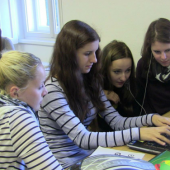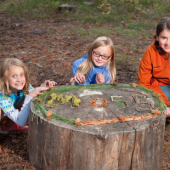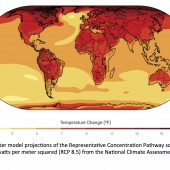
Abstract: The aim of this case study was to develop, apply and evaluate a science-education workshop format to communicate climate change to young people. Based on current theory in climate change communication and Education for Sustainable Development, the workshop has been applied in different contexts with more than 300 children and teenagers. A specification of the consecutive steps should help practitioners to use the workshop in their contexts. While results of the application of the workshop should give an insight into what can be expected from the workshop, an impact assessment of the participants who took place in the workshop outlines the effects it has on students. This paper does not only provide hands-on advice on how theoretical climate change communication knowledge can be translated into action, it also outlines the impacts of the described workshop.
Continue Reading
As scientific research evolves information in (K-12) curriculum can quickly become outdated. New research can greatly change the way we teach about science topics and the content we want students to understand. Educators, both formal and informal, can enrich their science curriculum by pulling from current research. Navigating the complexities and unanswered questions alongside scientists can provide a platform for discussion and insight into the nature of science and research that many students are not aware of, providing both a unique experience and valuable lesson on problem solving. Using lessons recently created in tandem with current aviation biofuels project, this article demonstrates the steps educators can take to use ongoing research to create lessons for their own audiences. As often noted in media and current events, finding a reliable, abundant, and sustainable source of transportation fuel is a high priority. One current research effort is being led by the U.S. Department of Agriculture–funded Northwest Advanced Renewables Alliance (NARA), which combines research efforts from industry and educational institutions to build a renewable supply chain for aviation biofuel. This article highlights steps suggested for educators to break down current research to create lessons for their audiences through an explanation of lessons that were developed using NARA research as a foundation. These steps include: Define the theme, Provide the background, Break down the parts, and Draw the parallels.
Continue Reading
Energy education, vital though it is, remains incomplete if it doesn’t explicitly address the impacts of human activities, specifically the combustion of buried solar energy/fossil fuels, on the environment in general and climate system in particular. Projections based on current emission trends indicate a likely increase of the radiative forcing of energy in the Earth system from around three waters per meter squared today to over eight by the year 2100, substantially heating the planet in the process. Efforts to avoid or minimize the connection between human energy consumption and changing climate amount to a form of science denial through omission. In order to address the causes, effects, and risks of climate change and appreciate the range of options to minimize negative impacts and maximize resilience, energy and climate literacy efforts should be combined and ideally infused throughout the curriculum.
Continue Reading